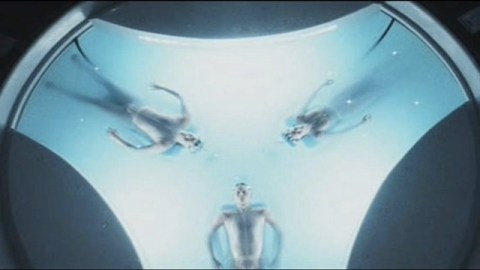Broken Taboo: A Major Journal Publishes Evidence of ESP

Psi is psychology’s equivalent of the perpetual motion machine in physics. Claims in favor of telepathy, clairvoyance, premonitions or other extra-sensory perceptions were always considered the realm of looney-tunes who write to professors with no margins and lots of fanciful diagrams. Or worse, the realm of con artists and a target for professional debunkers. What to make, then, of this paper (pdf), to be published in next month’s Journal of Personality and Social Psychology? Here, a social psychologist with impeccable credentials reports evidence for several `psi’ phenomena. All I can say is: I did not see that coming.
In his experiments, Daryl J. Bem found people scoring better than chance (not by much, but still, statistically significantly) on tests of their knowledge of future events—”precognition,” as it’s known to people who saw Minority Report (that’s where my image is from, by the way).
Bem’s paper is quite different from the usual target of skeptics. Firstly, as psychologists told me, he has an unassailable reputation as a serious guy in social psychology. His data are up to the profession’s standards and completely available to colleagues. Second, he doesn’t wander into the swamp of weird and speculative explanations for his results. According to accepted psychophysical theories, they’re impossible. E pur si muove. He leaves it at that, which means you can consider his results without committing yourself to a screwy grand theory.
Thirdly, rather than adopt some subculture’s exotic procedure, Bem used familiar instruments from psychology experiments, which measure perception and recall. That’s another reason his work is intelligible and reproducible by his colleagues.
To turn memory tests into tests of precognition, he simply reversed the usual time sequence (as a number of reports, including Peter Aldhous’, have pointed out).
For example, I often write here about “priming” experiments, in which the unconscious perception of a word will cause people to act differently than do others, who weren’t primed in the same way. One of Bem’s experiments involved going the other way down this street: He used data on 97 people who were flashed the word “beautiful” or the word “ugly” before seeing a picture. They then had to say whether the picture matched the word. In the usual sequence, students are slower to respond when the two perceptions are at odds—they’re faster to say a kitten matches the word “beautiful” than to say it doesn’t match the word “ugly.”
The students in the Bem experiment behaved as predicted on that test. But the test also worked in reverse. Shown a picture, they were more likely than chance to correctly predict what word would be flashed afterwards. In another experiment, participants had to guess in which of two spots on a screen an erotic image would appear (a reversal of the usual test, which asks them to recall where the hot picture was). As the positions were being selected at random by the computer, no one could know in advance where a picture would be.
By chance, then, the students should have been right exactly half the time. Instead, they predicted correctly just over 53 percent of the time. Not a big difference, but, as Melissa Burkley blogged last month, effects of that size are what support claims that aspirin can prevent heart attacks or that eating calcium helps build healthy bones.
Pretty spooky, and pretty interesting. Also, a textbook illustration of how scientific diplomacy—the introduction of a disparaged idea—works in the real world.
Daryl J. Bem (In Press). Feeling the future: Experimental evidence for anomalous retroactive influences on cognition and affect. Journal of Personality and Social Psychology : 10.1037/a0021524





